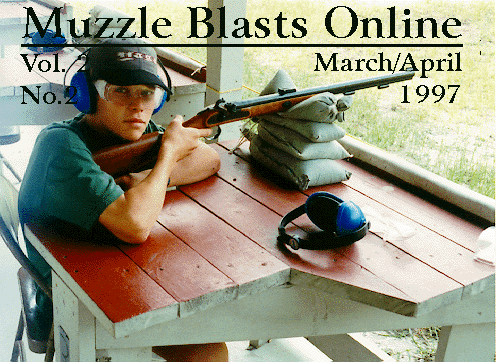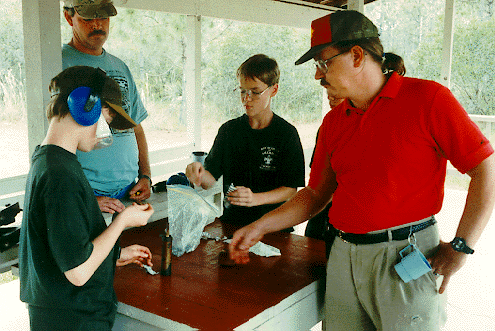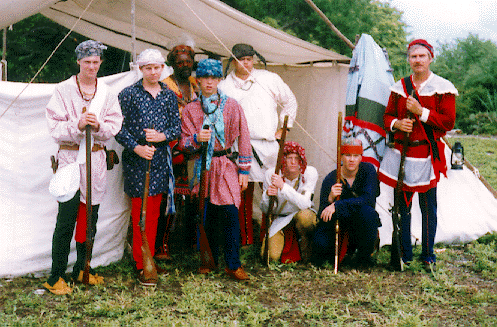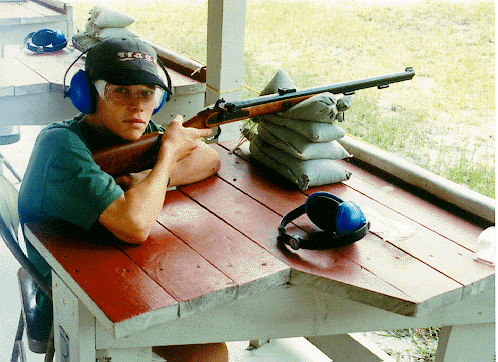|
Muzzle Blasts Online |
|
...for the muzzleloading enthusiast |
|
The muzzleblasts.com domain, subdomains, content, etc., are neither affiliated with the NMLRA nor its paper magazine Muzzle Blasts |
|
Muzzle Blasts Online |

|
|
|
|
|
|
Muzzleloading with the Boy Scouts
Aaron adjusted his ostrich feather-ornamented turban, wiped his sweaty hands on his calico shirt, and picked up his .45 caliber Lehman trade rifle. Taking careful aim from behind his position in the tall palmettos, he waited until the soldiers appeared in the open. Old Micanopy would fire the first shot, which was the signal for the others to open fire. In the din and confusion of battle, Aaron saw the soldiers fall despite the haze of white smoke from the guns. In a few brief minutes, Major Dade and his entire unit was destroyed, and the Second Seminole War had begun. Aaron is a veteran of several Seminole War battles. He fought alongside Alligator and Jumper at Panther Bend. He was at Okeechobee when the soldiers came, and fought together with Chekieka against the Indian Key settlement.
The Boy Scouts of America represent a considerable number of potential muzzleloading enthusiasts, both in the present and for the future. Boy Scouts can be far more than the bothersome, unsupervised adolescents running through your rendezvous campsites that they are often perceived as. They can be a means to insure good relations with the local population, a source of new members, and an opportunity to educate large numbers of future voters on the wholesomeness of our form of shooting sports.
Every muzzleloading club in the U.S., and throughout the free world, is near some scouting organization. In the U.S., scouting is divided into local ``councils,'' usually several counties or a portion of the state. Boy Scout Councils run at least one camp or scouting reservation in the council, and sometimes two or more, depending on the size and population of their area. Each of these camps is equipped with a rifle range, an archery range, and sometimes a shotgun range as well. Scouting includes Cub Scout, Boy Scout, and Explorer programs. Only Boy Scouts and Explorers may shoot firearms at camp. Cub Scouts, boys ages 6 to 11, are restricted to BB gun shooting. A boy must be 10 1/2 and in the fifth grade to join a Boy Scout Troop. Exploring is open to both boys and girls, at least 14 years old or in the 9th grade.

|
|
An adult coach observes the loading process at each loading station, and controls access to both black powder and percussion caps. |
For most scout councils, the camping year includes a ``summer camp'' session where boys come to camp with their troops for at least a week. All summer camps run a shooting sports program, organized by the shooting sports director, which can include .22 cal. rifle, muzzleloading rifle, muzzleloading shotgun, cartridge shotgun, and archery. Boys come to the ranges to work on completing the requirements for the rifle shooting, shotgun shooting, and archery merit badges. Scouts can earn both the rifle and shotgun shooting badges using muzzleloaders, if they choose, and if the equipment is available at their camp.
The shooting sports director is usually a volunteer, sometimes paid a small salary for the duration of the summer camp season, who has completed the required training at ``National Camp School'' (run by B.S.A. national office in each region around the country). This is to insure both basic competence and safety, as well as uniformity and adherence to Scouting's policies and regulations. shooting sports directors are responsible for the training and supervision of their staff and the operation of the ranges during the summer camp season.
The potential for any muzzleloading club to gain local members and goodwill should be immediately obvious. Not only would the sport of muzzleloading benefit immensely by introducing the next generation to black powder shooting, but their parents and adult scouters are then reached as well. While individual councils vary, scouting is in general very supportive of the shooting sports. The main limitations in most areas are the lack of trained instructors and the availability of adequate equipment. The boys' enthusiasm for opportunities to learn about and shoot muzzleloading firearms is never in limited supply!
Here's how you or your club can take the first steps to get the Boy Scouts in your area shooting muzzleloaders at their camp. Look in your phone book under ``Boy Scouts of America.'' The number may be for the local council, or one of their district representatives. Ask them about their council camps and the shooting program now being carried out. Chances are that summer camp is the only time that shooting is offered. Get the number of the camp ranger, and also the council executive. Talk to both of them about how you or your club can help to provide shooting opportunities at their camp range throughout the year, as well as assisting during the summer camp season. You might start off by holding a demonstration of black powder shooting at a Council ``Camporee'' (a gathering of most of the scout troops in the area), or at one of the many other large gatherings routinely held at scout camps.
While each camp usually formulates its own guidelines, when it comes to shooting muzzleloaders, light charges of Pyrodex and round balls with pre-cut, lubed patches seem to work out best in most places. This combination keeps the loading process simple, and makes the practice of wiping the bore between shots less critical. Sturdy range rods and good quality short starters are a necessity; so too is eye and ear protection! Start your beginners at the bench rest until they can shoot good, tight groups. Reserve the standing position for the older and more experienced shooters. Get the right sized targets for a simplified sight picture, and make sure the rifles are sighted in properly. Save the ``primitive'' targets for experienced shooters seeking a challenge.
It is also a good idea to have a CO2 gas operated ball discharger on hand for that inevitable ball loaded without powder. Good cleaning equipment is always important to insure that the rifles or shotguns will remain in good condition for many seasons. An organized ``corps'' of trained instructors, whose names and phone numbers are on hand at the council's office for scoutmasters planning to include shooting at an upcoming campout, is a great help in making it happen. Call the camp ranger before you arrive, and ascertain procedures for bringing guns and black powder into camp.
Many councils have a camping committee that meets monthly to insure that the camp is kept in good repair, and that the scout troops are able to access the facilities. Ask to make a presentation at one of their meetings and outline the possibilities that your club can provide. Offer help in range repairs or construction. Consider holding a fund raiser to buy some muzzleloading rifles for the camp. Get some of your members registered as adult scouters and merit badge councilors.
Consider chartering an Explorer Post that specializes in Indian and pioneer lore. Exploring is scouting for high school aged boys and girls with an emphasis on one facet, such as careers, high adventure, historical re-enacting, etc. There are numerous Explorer Posts already in existence; you may have noticed them attending some of the larger rendezvous. Your club would provide a place for the Explorer Post to meet, and some adult leaders to help. Financial support is usually not required, since the Explorers are supposed to earn their own way, but some kind of assistance in the form of fund raising opportunities is helpful.
In addition to the organizational assistance from the council office, chartered units have access to adult and junior leader training, community recognition and respect, incredibly inexpensive accident insurance, and in many states, tax exempt status if you care to make the effort to qualify.
The Boy Scouts of America is one of the few organizations still teaching our young men the values of citizenship, honesty, and duty to God. Scouting maintains a strong link to our pioneer heritage, and is compatible with our desire to practice old-time traditions and skills. Not only would the kids in your community benefit from your involvement in your scout camp's shooting program, your club would derive considerable exposure and goodwill in the process. As boys and their parents are exposed to the fun and excitement of shooting black powder firearms, they will also learn about your club. The advantage to you should be apparent. Perhaps less obvious is the satisfaction and pride that comes from watching those boys grow into the men who will take their place in the community as the leaders of tomorrow, and the knowledge that you had a hand in their training. There is no easier way to insure that our sport survives well into the next century.


